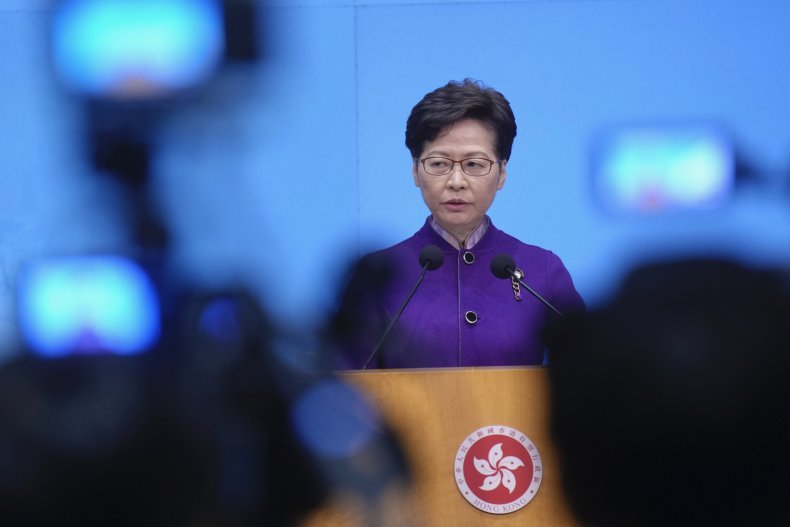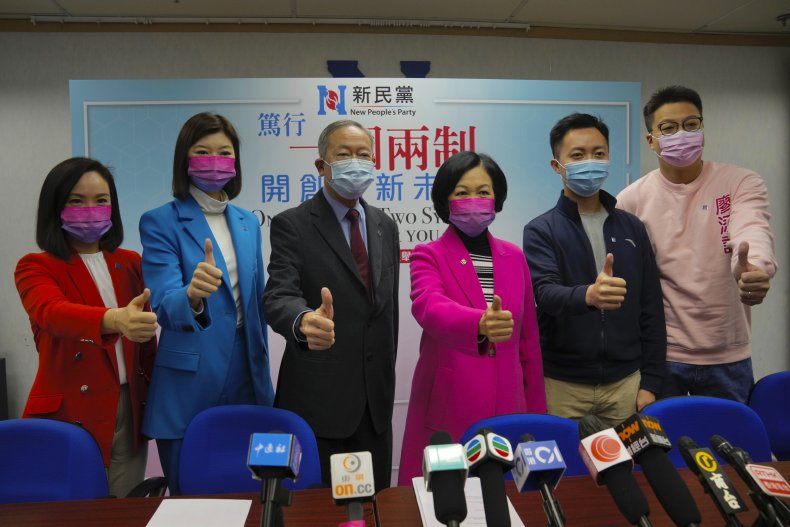Candidates loyal to Beijing won a majority of seats in Hong Kong’s legislative elections on Sunday, a landslide victory that comes in the wake of changes to the city’s elections. The hefty victory of those allegiant to China’s Communist Party has sparked worry among international leaders, some of whom released a joint statement Monday to express “grave concern over the election outcome.”
The changes to Hong Kong’s election laws only permitted pro-Beijing “patriots” to run for office in the city. The number of lawmakers elected directly by voters was also reduced from 35 to 20, despite the number of seats in the legislature being increased from 70 to 90.
Additionally, potential election candidates were required to go through a vetting process by a pro-Beijing committee before they could be nominated, and most lawmakers who weren’t directly elected by the city’s voters were appointed by mostly pro-Beijing bodies.
In the joint statement released by U.S. Secretary of State Antony Blinken in conjunction with foreign ministers from Australia, Britain, Canada and New Zealand, the global leaders voiced fears regarding the election changes and continued crackdown against opposition in the city.
“Actions that undermine Hong Kong’s rights, freedoms and high degree of autonomy are threatening our shared wish to see Hong Kong succeed,” the statement said.
The release described the candidate vetting process and reduction in the number of directly-elected officials as changes that have “eliminated any meaningful political opposition.” Aside from its criticism of the strict measures, it also referenced the imprisonment of opposition politicians and activists, “growing restrictions on freedom of speech and freedom of assembly” and pushback against certain trade unions, human rights organizations, non-governmental organizations and media freedoms.
“Protecting space for peaceful alternative views is the most effective way to ensure the stability and prosperity of Hong Kong. We urge the People’s Republic of China to act in accordance with its international obligations to respect protected rights and fundamental freedoms in Hong Kong, including those guaranteed under the Sino-British Joint Declaration,” the statement said

Vincent Yu/AP Photo
Hong Kong leader Carrie Lam said during a news conference Monday she was “satisfied” with the election despite a 30.2 percent voter turnout — the lowest since the British handed Hong Kong over to China in 1997.
She said that the number of registered voters reached 92.5 percent, a record high compared to the 2012 and 2016 elections, when around 70 percent of voters had registered.
“For registered voters, deciding whether they want to exercise their voting rights in a particular election is entirely a matter for themselves,” she said.
“In this election, 1.35 million voters cast their votes. They did not just return candidates of their choice to LegCo, and I think it was also because of their support for the improved electoral system,” said Lam, referring to the city’s Legislative Council.
Lam said that even if there was a high turnout based on “poor politics,” such as the political polarization during the period of political strife in 2019, that is “not something we should be glad to have.”
Starry Lee, an elected pro-Beijing legislative council candidate from the Democratic Alliance for the Betterment and Progress of Hong Kong party, said the 30 percent turnout was within “general public expectation.”
“As I have mentioned before, this is a new system, this is a system that we call patriots administrating Hong Kong,” Lee said.
“This is a different one from the previous one, therefore you cannot compare directly. And I believe that with the new system, people need time to get used to that.”
The opposition camp has criticized the elections, with the largest pro-democracy party, the Democratic Party, fielding no candidates for the first time since the 1997 handover.
Chinese Foreign Ministry spokesperson Zhao Lijian said there were “multiple reasons” for the decline in voter turnout.
“It is not only the impact of the pandemic, but also the disruption and sabotage of anti-China elements in Hong Kong and external forces,” Zhao said at a daily briefing.
Some overseas pro-democracy activists, including London-based Nathan Law, urged a boycott of the vote, saying the elections were undemocratic. Under the new election laws, incitement to boycott the voting or to cast invalid votes could be punished by up to three years in jail and a 200,000 Hong Kong dollar ($26,500) fine.
Lam said she expects that work with the 90 legislators will be “very exciting” because they have different opinions on many social issues.
Lam was to travel to Beijing later Monday on a duty-reporting trip, which she says is to give a full account to Beijing of the latest political and economic situation in Hong Kong.
“I expect to cover a wide range of issues on this particular duty visit because through two very decisive acts of the central authorities, Hong Kong is now back on the right track of ‘one country, two systems,'” she said.
The Associated Press contributed to this report.

Kin Cheung/AP Photo
Stay connected with us on social media platform for instant update click here to join our Twitter, & Facebook
We are now on Telegram. Click here to join our channel (@TechiUpdate) and stay updated with the latest Technology headlines.
For all the latest For Top Stories News Click Here
